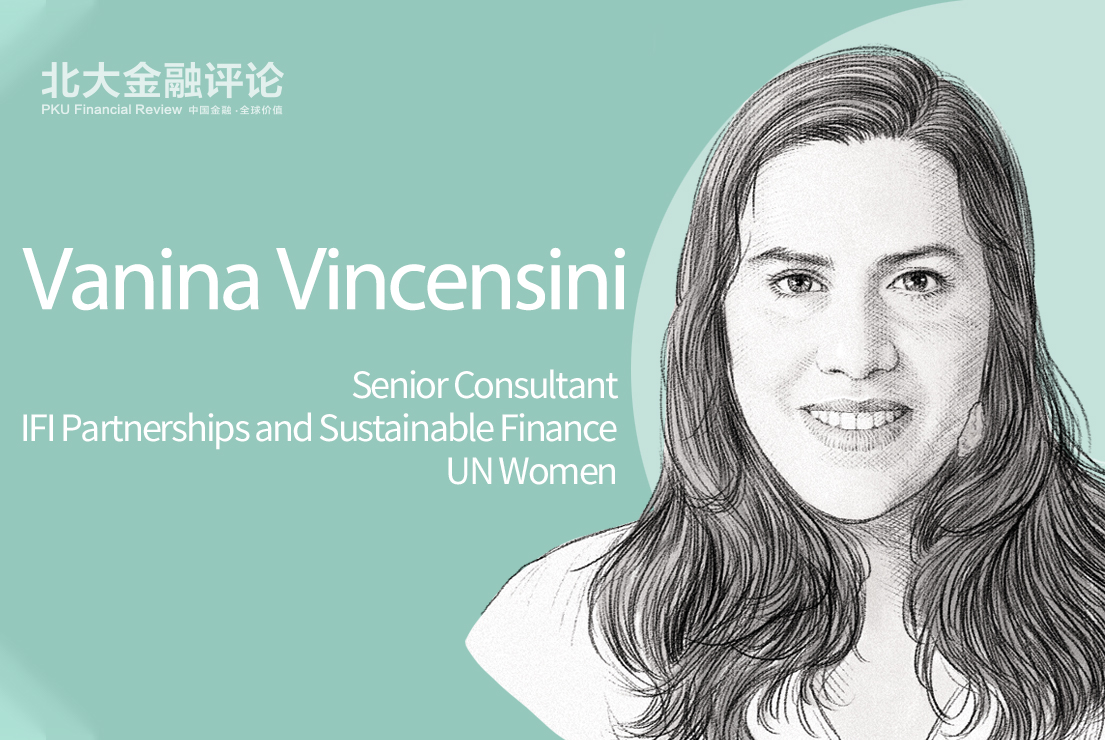Ms. Vanina Vincensini is the Senior Consultant, IFI Partnerships and Sustainable Finance of UN Women, who supports the implementation of UN Women’s global strategy to increase sustainable financing for gender equality. In the interview with
PKU Financial Review, Ms. Vincensini states that, financial service providers and development partners can deliver solutions that genuinely improve women's economic outcomes.
PKU Financial Review: The Feminization of poverty is a worldwide problem, not only in developing countries, but also in developed countries. Based on your observations, what do you think are the best ways to combat the Feminization of poverty?
Vanina Vincensini: The feminization of poverty means that women are more likely to live in extreme poverty than men, with 1 in every 10 women currently surviving on less than $2 a day. Without addressing gender disparities in areas like education, healthcare, and the labor market, an estimated 340 million women and girls will still be living in extreme poverty by 2030. This is a complex issue, but we know there are clear strategies to address it effectively.
First, closing the gender wage gap is crucial. Globally, women earn about 20% less than men. This persistent gap means that even when women work as much as men, they still end up with less money, perpetuating poverty. Addressing this requires strong policies that enforce equal pay for equal work, support women’s career advancement, and eliminate discrimination in the workplace.
Second, we must tackle the issue of unpaid care work, which disproportionately falls on women. Women globally spend 2.4 times more hours on unpaid care work than men, limiting their ability to engage in paid employment or education. This "time poverty" traps many women in a cycle of economic disadvantage. Governments can help by investing in care infrastructure and services, such as affordable childcare and eldercare, which would free up women’s time and allow them to pursue paid work and educational opportunities.
Third, access to affordable and tailored financial solutions is essential. Gender bonds are an innovative tool we're utilizing to channel investment toward addressing critical gender gaps, particularly in economic participation. These bonds fund initiatives that enhance women’s access to financial services, support women-led businesses, and reduce the responsibility for unpaid care work. We’ve recently seen how Iceland has linked the country’s financing needs to direct capital effectively to close gender gaps and promote women’s economic empowerment.
These strategies not only address immediate needs but also help build sustainable and inclusive societies in the long term.
PKU Financial Review: The theme of International Women's Day 2024 is "Invest in women: Accelerate progress." What do you think are the key areas for investing in women? Is it education, employment, health, political participation or technological innovation?
Vanina Vincensini: The return on investing in women is immense—creating a more equitable, prosperous global economy for all. However, the key areas for investment vary depending on where societies stand in terms of gender equality.
Investments in women require tailored strategies. In Africa, despite strong commitments to gender equality, poverty and insecure jobs for women call for economic empowerment initiatives. Latin America and the Caribbean have advanced legal protections for women, but persistent inequality and violence necessitate ongoing efforts in social inclusion and public security. In the Nordic region, where gender balance on boards is nearly achieved, the focus should now be on increasing female leadership at the CEO level. These regional differences highlight the need for context-specific investments to effectively advance gender equality.
To accelerate progress globally, I see three critical areas for investment over the next five years:
Resources: Closing the estimated $1.7 trillion credit gap for women-owned SMEs could lead to a 12% increase in global annual GDP by 2030. Beyond financial resources, investments are also needed in land ownership, technology, and information access, especially considering that 2.7 billion people lacked internet access in 2022 and women in 87% of countries are less likely than men to have secure rights over agricultural land.
Jobs: With 60% of women’s employment in the informal sector and a persistent gender pay gap, investing in measures like pay transparency and equal pay is essential. These actions would empower women with dignified work and close the earnings gap.
Time: Women spend three times more time on unpaid care work than men, valued at $10.8 trillion annually. Transforming care systems through public and private investment could generate nearly 300 million jobs by 2035.
Achieving these goals requires the collective support of governments, private sectors, civil society, women and men worldwide.
PKU Financial Review: Do you think the development of digital financial services has further enhanced women's economic empowerment, or has it widened the gender gap (given that women have traditionally had less of a voice in financial services and decision-making)?
Vanina Vincensini: The development of digital financial services (DFS) has indeed enhanced women's economic empowerment in some contexts, but the impact is nuanced and varies by region. On one hand, DFS have expanded access to financial services for millions of women, especially in countries like India and Brazil, where traditional banking was less accessible. These services save time, offer convenience, and can serve as a gateway to economic independence by giving women the ability to control their finances and participate in the formal economy. For example, in 16 out of 21 sub-Saharan African countries where over 20% of adults have a mobile money account, women are just as likely, if not more so, than men to use these accounts, allowing them to manage their finances conveniently and participate in the formal economy without needing to visit a bank.
However, access alone does not necessarily lead to empowerment. It requires that women can effectively utilize these services to improve their financial health, build economic security, and exercise greater control over their lives. Without adequate safeguards, tailored financial products, and financial education, DFS can expose women to risks such as fraud, deceptive sales, and over-indebtedness, particularly for those in vulnerable situations.
Financial service providers and development partners can go beyond merely increasing access—they can deliver solutions that genuinely improve women's economic outcomes. This requires embedding intentional, holistic gender equality investments within companies as part of a broader strategy to transform workplace culture, portfolios, client engagement and financial ecosystems to be more inclusive and responsive to women's needs.
Additionally, addressing the digital divide is crucial to ensure that all women, especially those in rural areas, can fully benefit from these innovations. A concrete example of that was announced by the Government of Rwanda, which has committed to bridging the gender gap in three specific areas by 2026: ownership of smartphones, access to digital financial services and STEM studies (science, technology, engineering and mathematics) at the upper-secondary level.
















